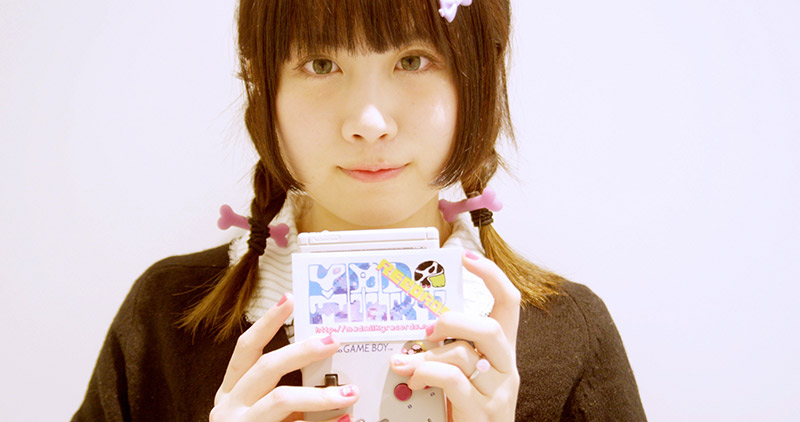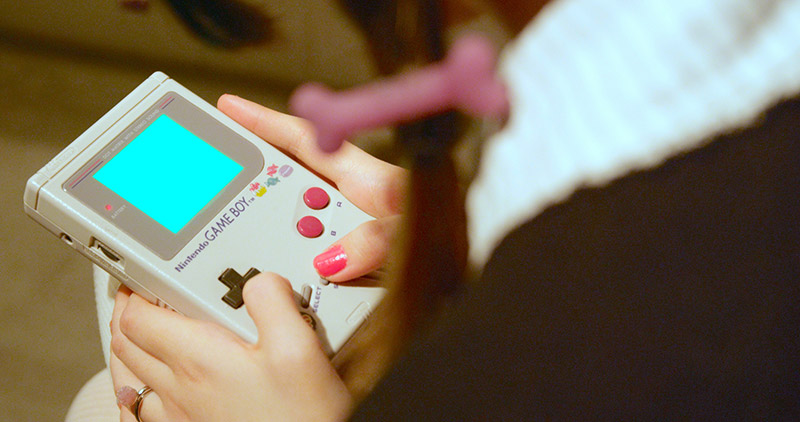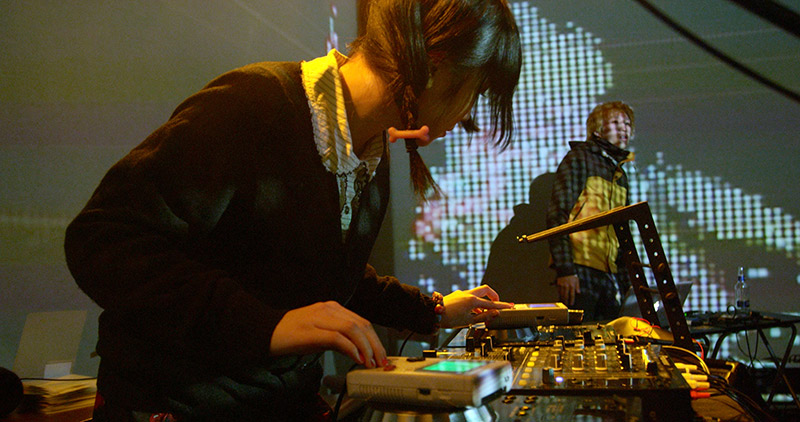The Game Boy has become a popular musical instrument in recent years. Many DJs use its internal sound chip to make music. But few use it like TORIENA.
She started making music on her Game Boy (also known as chiptune) in 2012 and hasn't slowed down. Her fast-paced and complex compositions make her stand out in the sea of chiptune DJs. She's performed at Blipfestival, Sasakure Festival, Square Sounds Festival, Design Festa Vol. 40. She founded her own label, MADMILKY RECORDS, in 2013 and was awarded "Best New Artist Award" at the World Wide Chiptune Awards.
TORIENA took some time away from composing, touring, collaborating, and making art for her music (yes, she does that too) to answer a few of our questions.

Q. How did you first get into making music? How long after that did you start making chiptune music and why?
There was no definitive reason why I set out to start making my own original music. But when I was a junior high student and (this may sound a bit audacious) I felt as though there wasn't any music out there that matched my preferences or met my needs. So I suppose that feeling was the biggest factor in why I started making my own music.
Also, I have loved music for as long as I can remember because I grew up with a family who loves music. When I was in high school, I had an overwhelming desire to play original songs in a band. But my parents were against it, so I wasn't able to. In the meantime, I got into artists from Warp Records and was drawn to electronic sounds. Eventually I found myself wanting to make techno music. In my 3rd year of high school, on a whim I went to an Internet label event for the first time, and was instantly fascinated by the high-volume electronic music coming from speakers. That moment spurred me into making my own electronic music.
As soon as I became a university student and started living by myself, I bought "Cubase6" and started making hard and minimal techno music. I joined a band club that mainly performed original songs and I had a lot of fun with them. One of the alumni from that club is NNNNNNNNNN. He is my senpai and someone I get along with very well. One day he asked me to start making chiptune with him. So we went to a café in Kyoto called "Café la siesta." Miraculously, the café owner let us use an LSDj cartridge that had been sitting around and we started making songs with that.
And here I am now. Come to think of it, it was all rather fateful.
Q. What brought you to the Game Boy as a musical instrument?
It plays direct and sharp sounds. Although many people say that electric sounds are very monotone and don't express any soul, I believe there is soul in its sound. Electric sound is a kind that doesn't naturally exist in the world, right? Human beings created these sounds all by ourselves. It's very mystical and sexy to me. I think electric noise created by humans is full of life force and soul. I really like the sound of the Game Boy. It comes directly out of the built-in chip in the form of a pulse or trianglular sound wave. It's like the chip is screaming out its feelings. Making it into an instrument and having it play music that is an audible expression of my heart and soul is what attracted me to it.
Q. Where did the name Toriena come from? What does it mean?
I actually get this question a lot. "TORI" means "bird" in Japanese and my birth year is the year of the bird. "ENA" came from my younger sister. I consulted her about my artist name with her, then her answer was like, "Your face fits the name ENA, so why don't you choose ENA?" Thinking back now, it's kind of weird. But nobody else has the name TORIENA and I liked the sound of it.

Q. Making music on the Game Boy is very complex. On top of that, your music is deeply complex. What kind of skills does it take to create such fast-paced music on the Game Boy?
I use Game Boy music composition software called "LSDj." The Game Boy sound chip offers only four channels with 4-bit sound. Within this restriction, I put multiple elements in one track to make your ears play tricks on you and make you believe you're listening to multiple sounds. I can also create one sound by using two channels. If I really started talking about it, I could go on forever.
Actually, the way to make music differs from person to person. So if you are thinking of making your own music, you have to try and fail over and over again until you get the hang of it. To be honest, I still have difficulty creating music in the exact way I envision it sounding. One of the most important things for creating music, I think, is not to persist on reaching one outcome or accepting one standard. You should listen to a wide variety of genres of music and learn of all the elements you like. While doing so, you should create your own music while happily dancing away. Then you will probably be able to make fun music by yourself. The most important thing is that YOU also enjoy your own music.
Q. Are there any systems or programs besides the Game Boy you use or would like to use to make music?
I'm using DTM a lot recently. I use CUbase too. I'm curious about working with SID sound source found in ATARI machines. The sound is good and is really interesting.
Q. Who are your musical influences?
Even though he's not a musician, I might have to say my father. He likes roots reggae and R&B, and he has listened to those genres on his record player and huge sound system since I was little. I am not sure, but I assume I have always thought deep down that it's really cool music. When I started getting into music, I borrowed some records of his and listened to a variety of genres. He recommended some music as well and also gave me a rock compilation album.
Q. Your Pulse Fighter music video is amazing! Is there any chance there will be a Toriena game?
Thank you for those very kind words! Actually, I made an app game called "Pico^2 Sprite" with m7kenji who was in charge of the pixel art and video of Pulse Fighter. Like the music video, I did the music, sound effects, character design, and the scenario. m7kenji did the pixel art, the boss characters, and the UI. It is a puzzle game and all the characters including the boss are very unique. I'm sure you will enjoy it!
Q. You founded your own label, MADMILKY Records, in 2013. What inspired you to make the jump from artist to producer?
When I performed at BLIP Festival Tokyo in 2012, a thought raced through my mind. It was that chiptune is really awesome and I want to make it much more popular in Japan. I talked about it to NNNNNNNNNN who was performing there as well, and we ended up deciding to make a music label together.
Q. What are your favorite games? Which games inspire you to make music?
My absolute favorite game ever is MOTHER 2. I've played it over and over again. The best part is the pixel art. I also like the story, which is very well written. It actually influenced my worldview quite a bit. I also like Kirby and the Pokemon series. I like them for their music. Sometimes I even just listen to the music from those games.
Q. What foods go hand-in-hand with chiptune music?
Pepsi and Haribo gummy candies. I always have them while making music and drawing.
Q. Can you tell us a story about your job that you've never told anyone?
I don't know anything about musical theory. Although I used to play the bass and contrabass, I couldn't read music, so I just played by ear. I am also very bad at sports, haha!
Q. What skills beyond music does it take to be a successful musician?
I think people need to clarify what it is they actually want to do. I believe that everybody has a dream, but it's often vague. You should understand yourself and your dream really well and pursue it. Throughout the process, you'll form your own unique style and you'll become an artist that can't be replaced. That said, I'm still on my way to becoming an artist like that.
Q. What skills do you need to be a successful musician in Japan particularly?
Japanese people care about courtesy, duty, and humanity. So I believe communication ability is necessary. If you don't forget to be thankful and thoughtful, you'll get to know more and more good people, and that will lead you to success.

Q. What advice do you have for our readers who may want to become DJs in Japan?
I don't know much about the club scene overseas, so my advice comes solely from a Japanese standpoint. First, you should clarify what kind of music you like and what kind of performance you want to give. It might be good to mimic one or two DJs whom you really admire. You can get a leg up on others by having at least one unique thing that you are good at because people may think, "We should call so-and-so for this kind of music event! We should ask them to perform for us." I believe it allows you to play a more active part in your success.
Other than that, just don't forget the spirit with which you started and be polite to everyone you meet. Apart from that, you should certainly also strive to learn more and more DJ techniques.
Q. Is there anything else you want to say about your job or any messages to Tofugu readers?
I am preparing to release a new song in a popular series. I am also thinking of releasing something interesting this year. My overseas live performances are also scheduled too, so if you see I'm coming to your town, please come out!
I have concerts on October 24 and 31 in UK. The details haven't been revealed yet, but it'd be great if you can keep your eye on it. I'd also like to create more video content and distribute my concert performances and music videos more.
I'd be happy if Tofugu readers who read this interview got interested in me and/or chiptune even a little bit.
Q. What's the one question you wish people would ask you but never do (Then answer it!)
The question I wish people would ask me is, "what's your final goal?" I do a lot of things from composing to illustrating to performing, but I don't want to be limited by anything. I want to be a person that can't be replaced. The one and only TORIENA. I want to be a stylish girl with various charming attributes which, like a hologram, change depending on your perspective.
